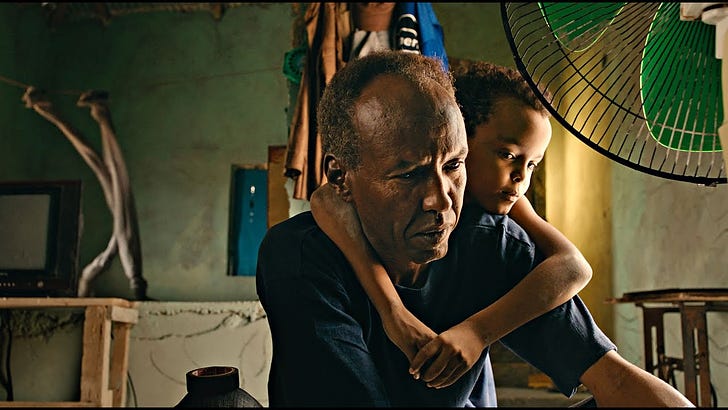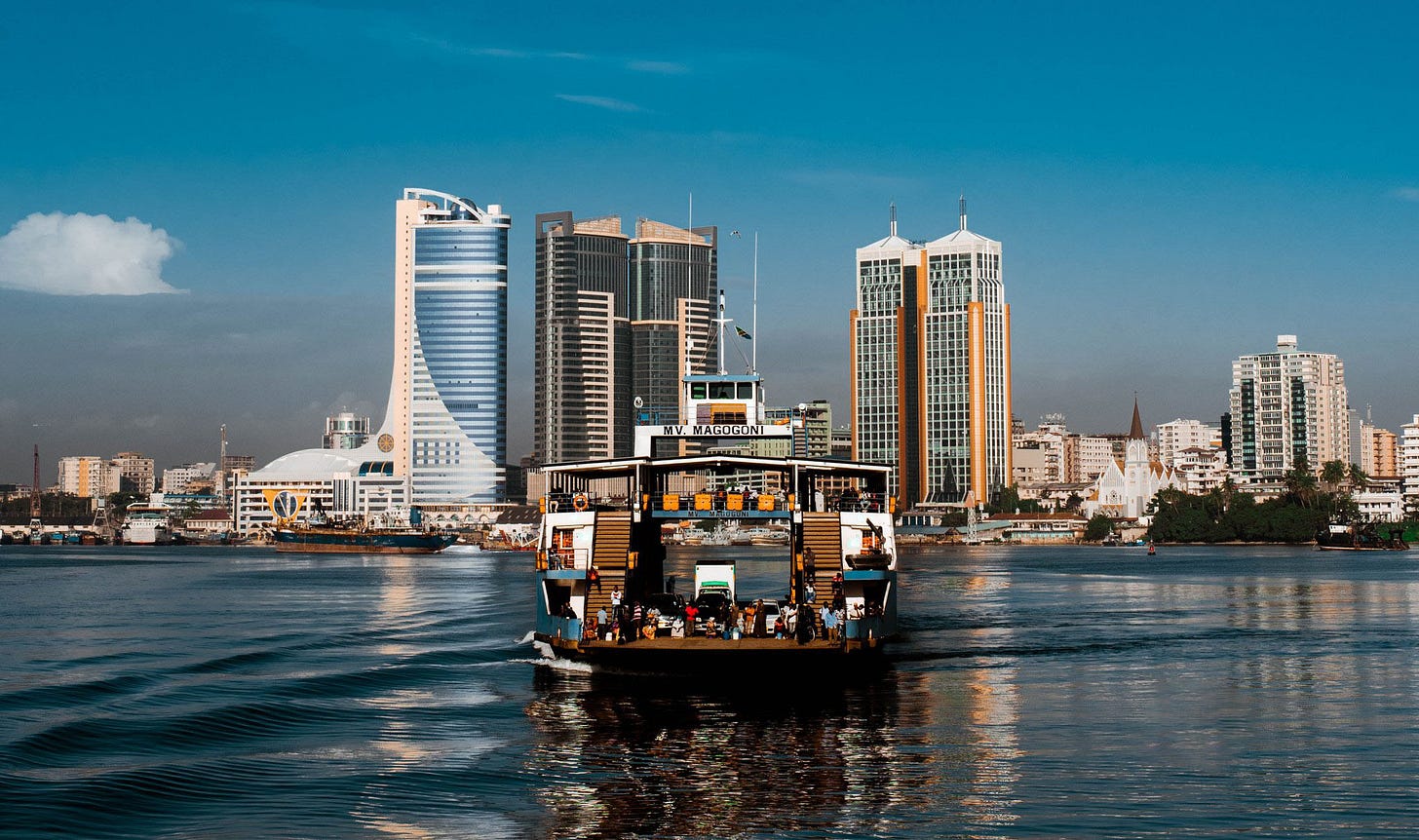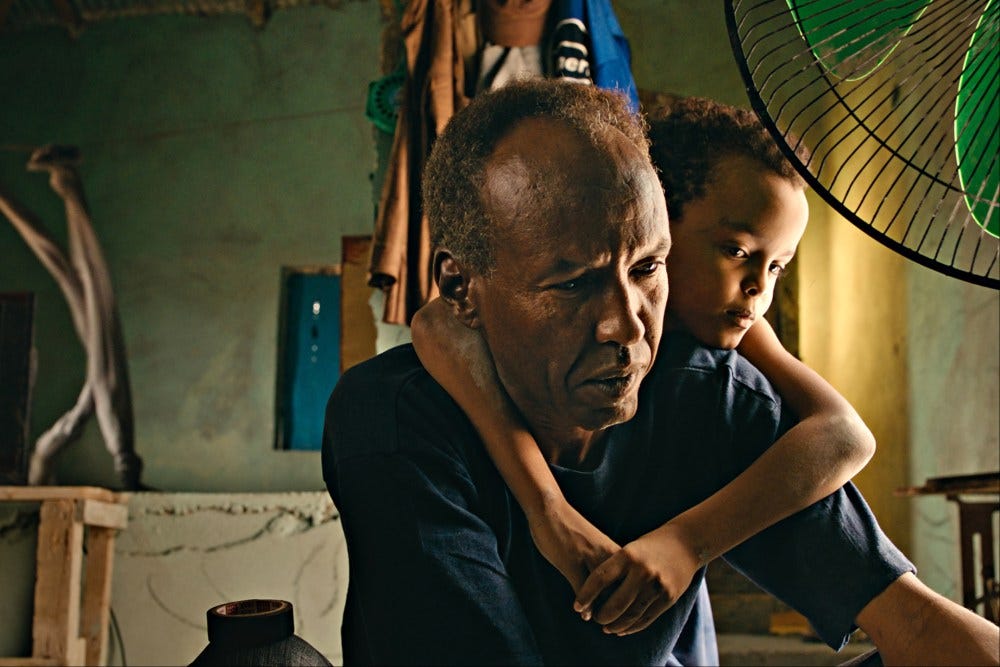🔅 Somalia's Cannes Debut
Harawe's Cannes Debut, Ethiopia's Coffee Rituals, and the Tiny Nation at the Center of Global Turmoil
Photo of the Day
Spotlight Stories
Somali Filmmaker Mo Harawe Makes History at Cannes with Poignant Feature Debut
Mo Harawe, a Somali filmmaker who emigrated to Austria in 2009, is making waves at the 2023 Cannes Film Festival with his feature debut, "The Village Next to Paradise." The film, which premieres on May 21 in the Un Certain Regard section, is the first feature from Somalia ever to screen at the prestigious festival.
"The Village Next to Paradise" is an intimate family drama that follows Mamargade, a single father working tirelessly to provide a better life for his son, Cigaal, in a windswept Somali fishing village. When Mamargade's sister, Araweelo, returns to live with them after her divorce, each family member pursues their own ambitions in a country plagued by civil war, natural disasters, and the constant threat of U.S. drones.
Harawe's film is a tribute to love, family, and resilience. The director, who taught himself the fundamentals of filmmaking before pursuing formal studies in Germany, uses cinema to bridge the gap between his memories of Somalia and the way the country is perceived through a European lens.
Exploring the Complexities of Somalia
The film does not shy away from the complexities of life in Somalia, an impoverished nation grappling with a violent insurgency and the consequences of the U.S. war on terror. However, Harawe resists the urge to portray Somalis as helpless victims, instead focusing on the intimate bonds of his unconventional but tight-knit family unit and exploring how individuals assume or evade responsibility for their actions.
The director is careful not to pass judgment on his characters when they make compromises in the face of forces beyond their control. "If you survive in these kinds of circumstances, you are superhuman. And if you don't make it, then you're still human," Harawe explains.
Despite the film's title hinting at the thwarted promise of a troubled country, Harawe insists that Somalis, bound by family ties and an unwavering perseverance, are ultimately masters of their own fate. "There is still hope. You can take a lot of things, but that's not something you can take from them," he says. "There is a freedom in that. It's hard to describe. There is a freedom when you have this hope and you have this resilience. No matter what happens, there is tomorrow."
As "The Village Next to Paradise" makes its historic premiere at the Cannes Film Festival, Harawe's poignant and personal debut serves as a powerful reminder of the strength and resilience of the Somali people, even in the face of seemingly insurmountable challenges.
Coffee, Community, and Tradition: Ethiopia's Cherished Three-Cup Ritual
In Ethiopia, the birthplace of coffee, brewing and drinking this beloved beverage is a cherished ritual that brings people together and celebrates the country's rich cultural heritage. If you want to learn more about the fascinating world of Ethiopian coffee culture, look no further than this write-up from The Guardian.
Discover the intricate process of preparing coffee the traditional Ethiopian way, from roasting the raw green beans over an open fire to grinding them by hand and brewing them in a beautiful, long-necked clay pot called a jebena.
However, the article goes beyond the mechanics of coffee preparation.
It delves into the social and cultural importance of coffee ceremonies in Ethiopia, where sharing a cup (or three!) strengthens community bonds.
You'll also discover the fascinating regional variations in Ethiopian coffee culture, from the addition of salt or butter in some areas to the use of medicinal herbs like rue. And you'll learn about the economic importance of coffee in Ethiopia, the world's fifth-largest producer of coffee beans.
But as the country modernizes and the pace of life quickens, traditional coffee ceremonies are becoming less common in some areas. Why? You can find out right here.

Djibouti: The Tiny Nation at the Center of Global Turmoil
Djibouti, a small East African country with a population of just 1 million, finds itself in the middle of a geopolitical storm. Missiles from Yemen whiz past its coastline, while it's surrounded by a country ravaged by insurgency (Somalia), and a regional powerhouse recovering from civil war (Ethiopia).
But Djibouti has managed to turn its location into a strategic asset, becoming an indispensable player in the region while maintaining neutrality. When the US asked to conduct operations against Houthi militants from its naval base in Djibouti, the government politely declined. However, it allowed EU naval vessels to dock and refuel as part of efforts to keep the same Houthis at bay.
Djibouti's port is thriving as more ships unload goods onto smaller vessels to navigate the dangerous Red Sea. The predominantly Islamic, former French colony has become a hub for international military investments and intelligence gathering. Its location at the meeting point of the Red Sea and the Gulf of Aden has attracted military bases from China, France, Italy, Japan, and the US, with Germany eager to join the party.
Who would have thought that being in such a neighbourhood could be so attractive to global powers? Djibouti's strategic importance is only set to grow, proving that sometimes, it pays to be the tiny nation at the centre of it all.
Food for Thought
“He who runs after good fortune runs away from peace."







